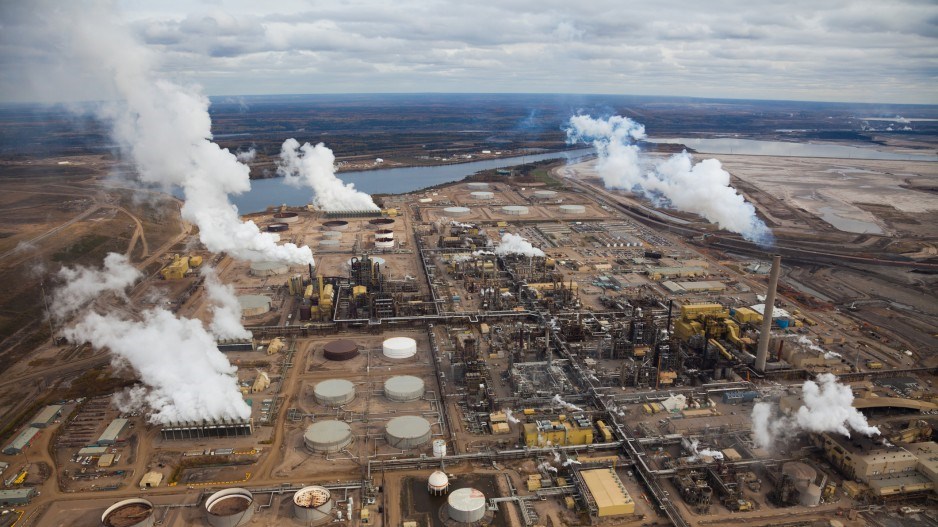Canada’s Competition Bureau has launched a formal inquiry into the advertising practices of some of the country’s largest oil and gas producers following allegations the group made “misleading” claims around their plan to achieve net-zero emissions.
The complaint was submitted by a handful of environmental groups in March 2023, including Greenpeace Canada, the Canadian Association of Physicians for the Environment, and Environmental Defence. It targets six companies forming the Pathways Alliance — Canadian Natural Resources Limited (CNRL), Cenovus Energy, ConocoPhillips Canada, Imperial, MEG Energy and Suncor Energy — and their “Let’s clear the air campaign.”
The complaint claims the Pathways Alliance misled Canadians in its advertising campaign touting its plan to achieve net-zero emissions by 2050 — largely, by failing to account for more than 80 per cent of their emissions released when their fossil fuels are burned.
Those ads ran across television, major Canadian newspapers, their website, podcasts, social media and at least one billboard outside BC Place stadium in Vancouver. In several cases, the coalition ran television ads during several high-profile events, including during the FIFA World Cup, the Australian Open and the 2023 Super Bowl. Since then, the ad campaign has continued, popping online and on bus stops in Metro Vancouver, among other places.
“We think the public deserves to be told the truth about the environmental harm caused by fossil fuel production, not fed misleading soundbites by industry,” Nola Poirier, a senior researcher and writer with Greenpeace Canada, said in a written statement.
“Net-zero greenwashing is pervasive and there is a distinct need for accountability in advertising that incorporates the entire lifecycle of fossil fuels from their production to their combustion.”
In a statement to Glacier Media Thursday, Pathways Alliance's vice-president external relations Mark Cameron acknowledged the oil sands represents “a significant share of our country’s emissions” and that industry must work with governments to achieve net-zero emissions and deliver “responsibly produced oil.”
“We strongly disagree with the assertions in the Greenpeace complaint,” said Cameron.
“We will continue to speak on behalf of one of Canada’s most important industries and show how we’re addressing the climate challenge, while ensuring our country plays a leading role in providing global energy security and affordability.”
Should the Competition Bureau find the Pathways Alliance breached the Competition Act, the complaint calls on the independent law enforcement agency to pay a three per cent penalty based on their gross worldwide profits. That would add up to an $8.5-billion penalty, money which would go to the federal Environmental Damages fund to rehabilitate damage surrounding the Alberta oil sands.
Canada’s Competition Bureau has launched a number of investigations in recent years targeting alleged “greenwashing” — when companies make claims falsely touting their environmental credentials.
In November 2022, the bureau launched an inquiry into the Canadian Gas Association’s (CGA) “Fuelling Canada” advertising campaign after it allegedly ran “false and misleading” claims promoting LNG as a clean fuel source.
A month later, the CGA was among more than 150 global gas producers and industry groups implicated in an alleged global public messaging campaign to combat an “active global debate” around climate change and push back against a “potentially existential” threat to its worldwide operations.
The report, produced by the climate research group InfluenceMap, relied on previously unseen internal documents produced between 2017 to 2021 and gathered while temporarily posted to the International Gas Union’s (IGU) website.
They show how the IGU sought to shape the narrative that gas plays in a world increasingly pushing toward decarbonization.
IGU’s Tatiana Khanberg, who used to work as a policy advisor to the Ontario government, according to her LinkedInprofile, did not directly respond to questions around how IGU has run a coordinated messaging campaign, or how its Canadian members have used its playbook.
“The IGU calls for a constructive dialogue between all key actors and stakeholders,” Khanberg told Glacier Media at the time.
InfluenceMap's Faye Holder, who helped author the report, said that, like the rest of the world, the documents show “Canadian regulators and the public are finding themselves the target of coordinated gas industry disinformation.”
“This has included advocating for the expansion of LNG on account of its 'lower emissions' and the need for energy security, as well as attempts to weaken the government’s oil and gas emissions cap,” she said.




